Las Vegas pinball wizard ‘Spittin’ Jerry’ boasts of being the best
To call “Spittin’ ” Jerry Kaczmarek one of the best to ever play a now-vanished type of pinball game known as a bingo machine is to do him a disservice, he says.
“I was the best pinball machine player that ever lived,” said the 72-year-old Kaczmarek, who usually introduces himself simply as “Spitter.”
So prodigious was his prowess on the machines, which, unlike most pinballs, paid out in coins, that he says he was able to support himself and his then-wife in Las Vegas through the 1970s and into the early ’80s.
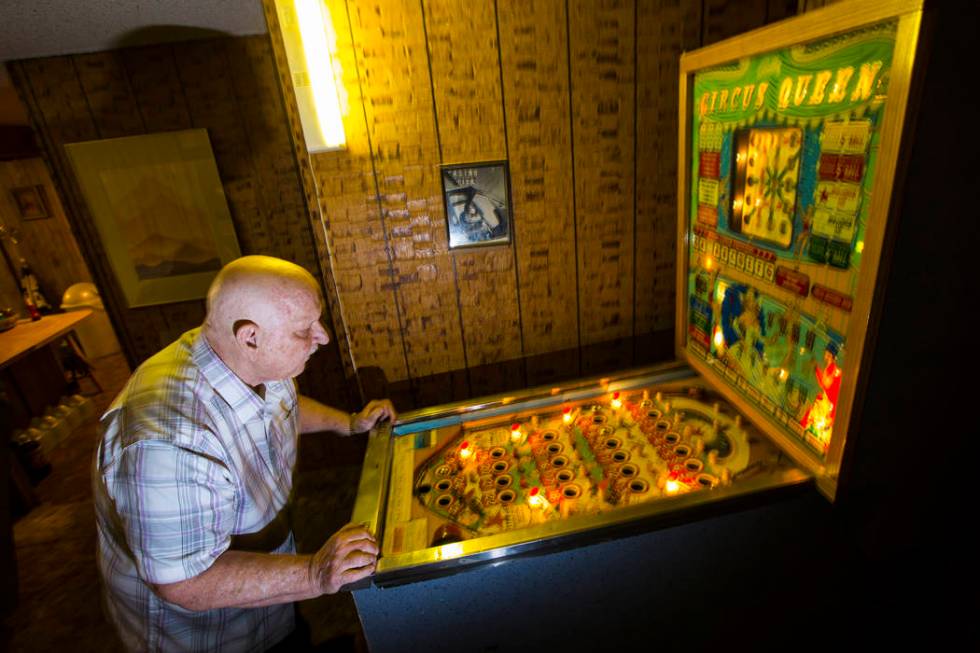
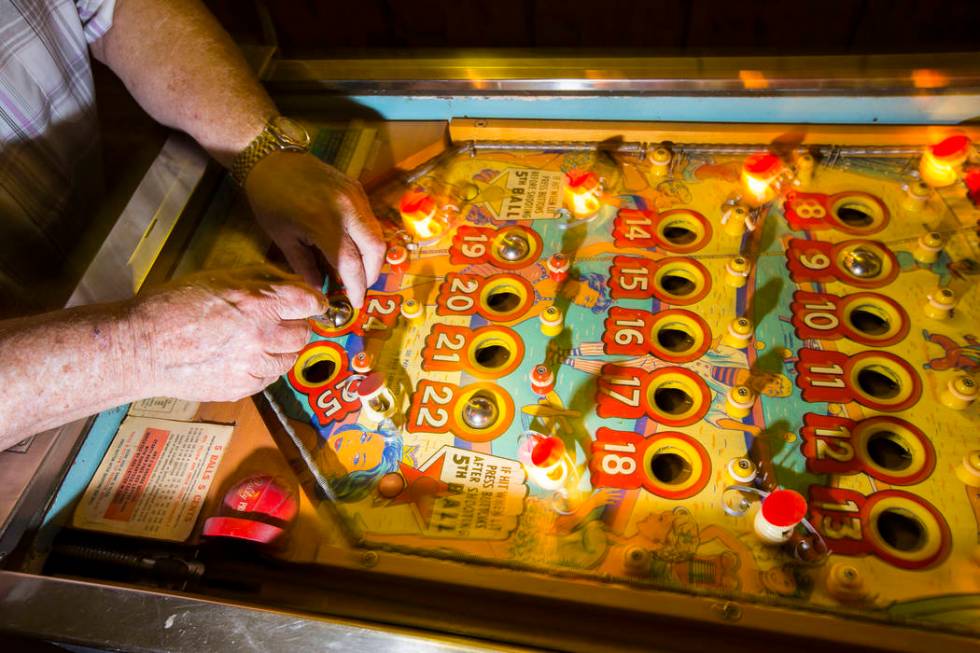
The biggest downside, he said, interrupting himself with a laugh, is that he was always driving his Cadillac, with the personalized license plate reading “SALIVA,” around town with a trunk full of nickels, dimes and quarters.
The problem with being a purported master of a forgotten art is that such claims are open to skepticism and outright disbelief.
I was the best pinball machine player that ever lived.
Jerry 'Spitter' Kaczmarek
“The guy is full of s—-,” Tim Arnold, co-founder of the Pinball Hall of Fame and president of the nonprofit Las Vegas Pinball Collectors Club, said when asked about Kaczmarek’s claim. “Bally wouldn’t have designed and continued to build for 30 years a machine that could be beat by the player. It’s absolutely beyond belief that you would fall for a story like that.”
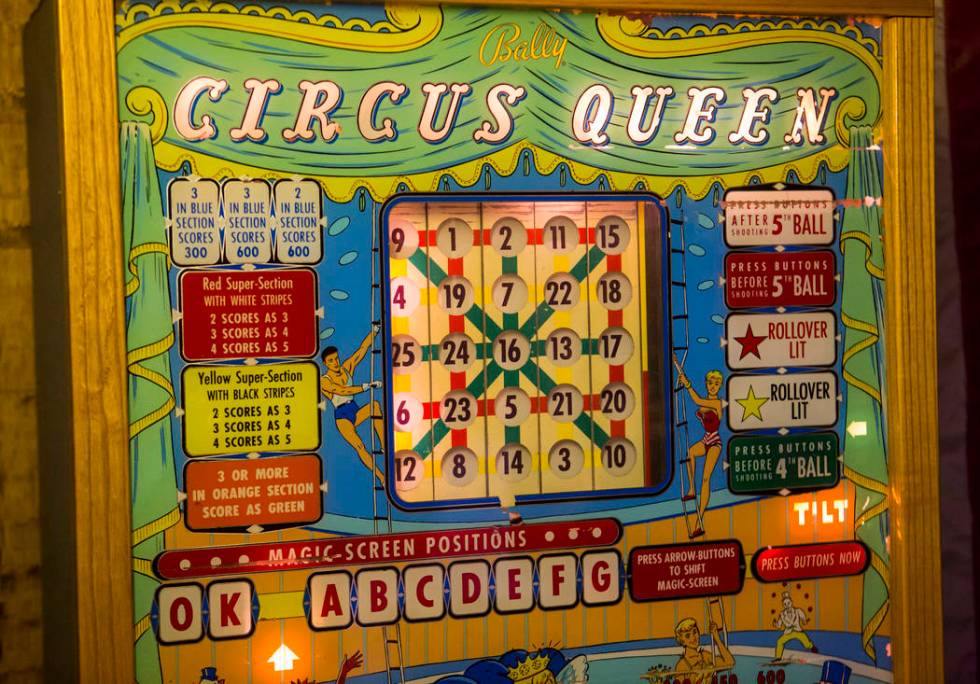
Games of chance
Such a reaction is understandable, given that the bingo pinball machines, also known as payoff or payout pinballs and “juke boards,” which appeared in 1951, were designed to be true games of chance.
Unlike the pinball games that most Americans are familiar with, the bingo machines had no flippers to shoot the metal balls back to the top of the field of play, which adds an element of skill. Instead, players fired the silver metal balls using the standard spring-loaded striker and then watched them bounce off a series of rubber-ringed metal posts before landing in numbered holes.
The holes corresponded with a display on the upper portion of the machine resembling bingo cards, which is how the machines came by their name. The grids indicated how much a player would earn if the balls landed in particular holes.
“You used to see them in the bars a lot, and occasionally you’d see one or two in a casino,” recalls Charlie Lombardo, a Henderson gaming consultant who has worked in the industry since the early 1970s. “Most people didn’t realize what they were, so they would put money in them even though they didn’t understand how they worked. They didn’t realize it was a gambling device.”
The machines were popular in many parts of the country in their heyday. Most paid out in free games, though proprietors would often quietly pay off players in cash and then reset the machines. But in in Las Vegas, they simply spewed out coins, just like slot machines.
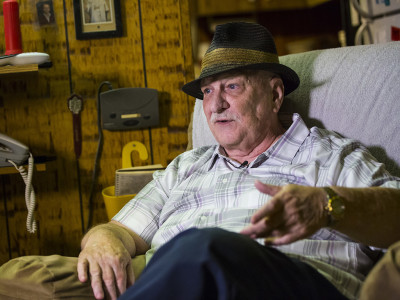
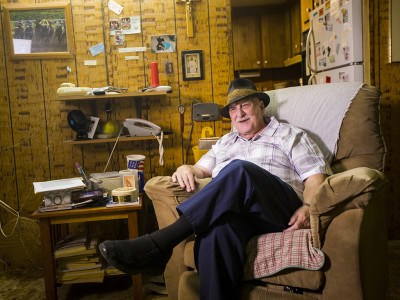
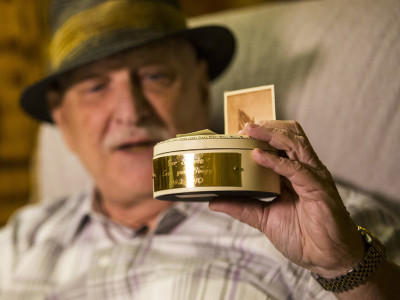
Spitter, who got his nickname in his native Louisiana when a bar owner inquired about a puddle of spilled beer and a friend replied that it was the messy byproduct of Kaczmarek’s habit of loudly blowing air through his lips in a sort of Bronx cheer while he was playing, says the sharp players knew a trick that enabled them to manipulate the balls.
The key was forcefully slamming the machine at just the moment it struck a post or a ball already nestled in a hole, Kaczmarek explained. You had to hit it nearly straight on and hard, he said, to avoid activating the “tilt” mechanism that would shut the machine down, but when it was done just right, it was possible to make the ball in motion move left or right — a move he calls “wheeling” — and even knock the other ball out of the hole by varying the force and timing of the blows.
“Nobody believes you could beat ’em, but you could beat ’em,” he said during a recent interview in his home in Bullhead City, Arizona. “Anybody who saw me play ’em couldn’t believe what they saw because I could make the ball spin around, bounce it off one ball to another. … Even I don’t believe it how good I was.”
He demonstrated how it worked on a battered old Bally’s Circus Queen machine that he keeps in his living room, a gift from casino owner Don Laughlin, he says. The exercise looked a bit like a heavyweight fight, with Spitter repeatedly slamming his sinewy Popeye-size forearms into the machine, causing the ball to alter course while it obeyed gravity and bounced its way downward.
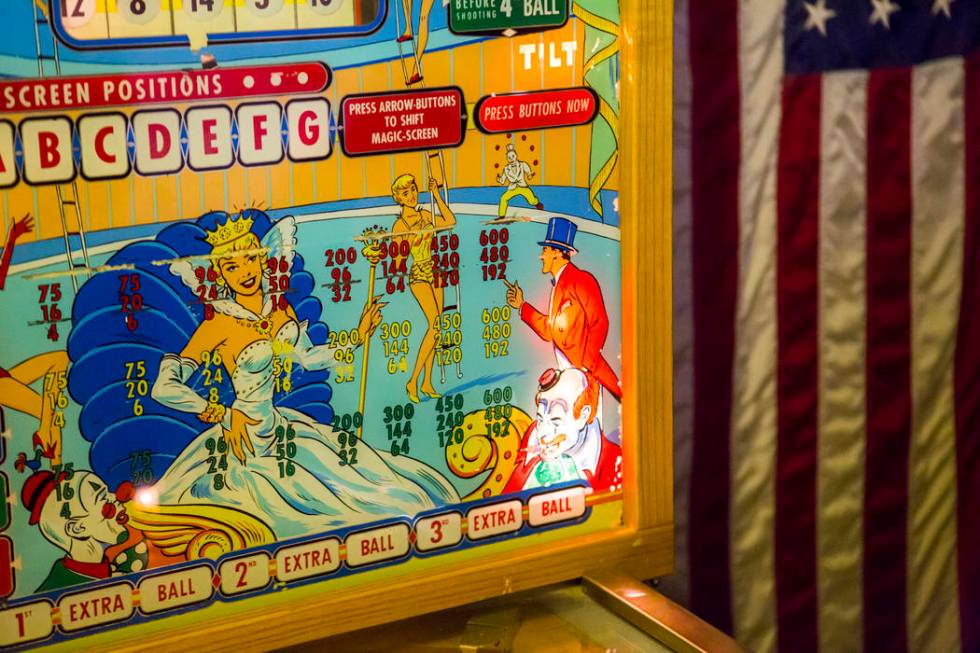
Off to Las Vegas
Spitter said he learned how to play as a teenager in Louisiana and quickly was able to beat the games there. But after getting banned by countless bar and arcade owners, he and his best friend “Boogy” Prejean, a pool hustler, set out for Las Vegas in the late 1960s.
He said he and Boogy (pronounced Boo-GEE) soon became regulars at a bar and poolroom called the Sport Palace, a favored hangout at the time for hustlers and ne’er-do-wells, guys like Bobby Jacks, a bowling hustler; Toothless Joe, a dipper (pickpocket) and Johnny J., a counterfeiter who was arrested with $6 million in phony bills that he was passing through the betting windows at Santa Anita Park in California.
Others in the crew were outright cheaters, Spitter acknowledges. One friend named Chuck, who worked as a dealer at Binion’s, got caught “chipmunking chips,” slipping them into his cheeks while pretending to apply lip balm.
“Teddy (Binion) walked Chuck into the back … (and) beat the living hell out of the guy. I saw (Chuck) the next day at Sam’s Town. He had a body cast … from head to toe. I says, ‘You’re lucky he didn’t kill you.’ He says, ‘The only reason he didn’t is because we went to school together. I figure I got a break.”
But Kaczmarek insists he never cheated; he just beat the games by being good.
He recalls that as word of his repeated wins began getting around, the United Coin Machine Co., which owned the bingo machines in Las Vegas, sent detectives from Griffin Investigations and agents from the state Gaming Control Board to see what this Southern kid was up to. He says they came to the same conclusion: They couldn’t arrest him or strong-arm him because he wasn’t doing anything wrong except winning.
He says he grew friendly with one of the detectives, Dennis Larounis, who was watching him play one day when he made what he considers the most difficult play he ever pulled off: knocking a ball nestled in the 12-hole out and into the 11.
“Dennis said, ‘I don’t believe what I just saw,’” he said. “He called United Coin, and they said it can’t be done. He said, ‘Well I just watched it.’”
According to Kaczmarek, his 15-year-plus run as a professional bingo machine player came to an end in 1981, when Randy Miller, an official at United Coin, distributed what looked like a “wanted” poster with his likeness on it, warning bar and arcade owners not to let him play and to call Griffin Investigations if they spotted him.
Miller, who left the company years ago but still owns a couple of taverns in the Las Vegas Valley, said he didn’t remember Kaczmarek but acknowledged that his story is plausible.
“It’s very possible, but I can’t confirm it. I just don’t remember that name,” he said. “But there were a bunch of players like that where we’d circulate a poster warning owners.”
Beverly Griffin, widow of Griffin Investigations founder Bob Griffin, said she had no record of Kaczmarek in their books of personae non gratae. But she also said that his story of being banned by United Coin sounds like it could have happened the way he describes.
“United Coin was in charge of their own machines,” Griffin said. “If someone was messing with their machines, they’d ban them. … Then they’d use us as the bad guys because we had a reputation.”
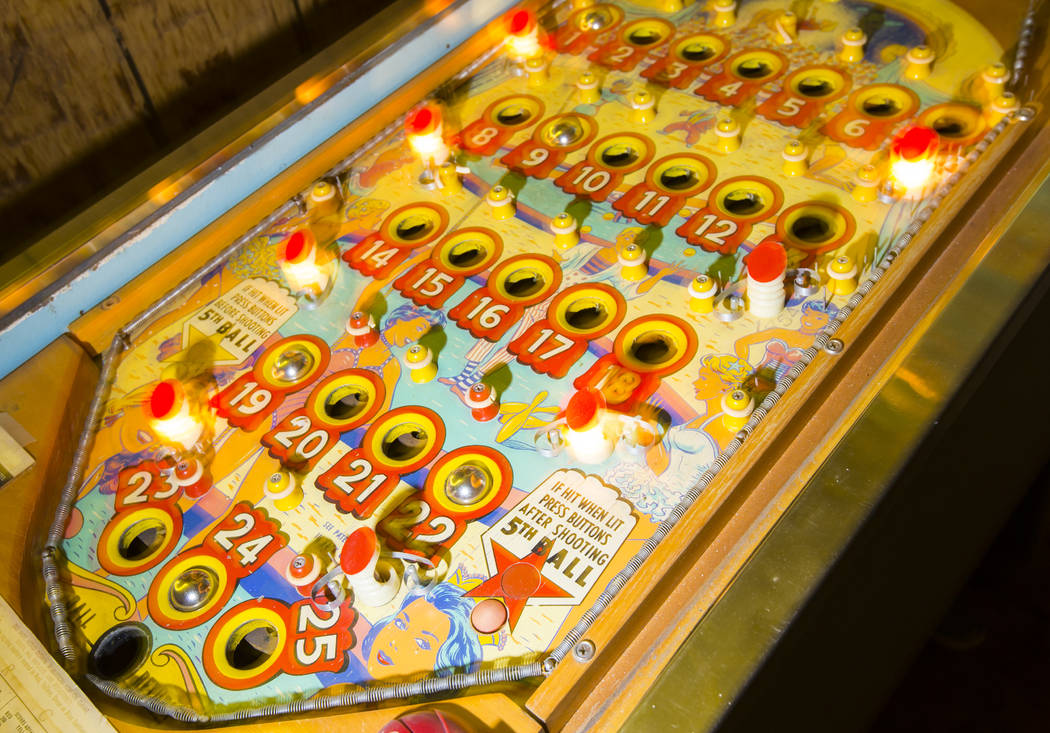
Banned from pinball
With Kaczmarek’s help, the Review-Journal also tracked down a few people who bolstered his tale.
Kaczmarek’s ex-wife, Lisa Musso, 64, said she remembers Miller giving Spitter the word that his bingo-banging days were over.
“He just told him he didn’t want him playing the machines anymore,” she said. “He was tired of him winning all the money.”
A couple of other locals who were fond of the bingo machines said Spitter was the best they ever saw.
I never seen anyone control the ball better than him.
Jim Wire
“I never seen anyone control the ball better than him,” said Jim Wire, 68, of Henderson. “He’s the only one I ever saw shoot it out of the hole.”
And “Nardy” Redlinger, 71, a neighbor of Kaczmarek’s when they were kids, said he watched Spitter beat the games consistently in Nevada and Louisiana.
“I played the machines, too, but he was much better than me,” said Redlinger, who lives in Laughlin. “I didn’t see anybody any better. That’s basically all he did, even after he graduated. He didn’t work for years.”
Lombardo, the gaming industry consultant, said he never saw anyone who could beat the bingo machines, and like the Pinball Hall of Fame’s Arnold, he is skeptical of the legend of Spittin’ Jerry.
On the other hand, he said, he’s been around long enough not to completely discount it either.
“If there’s an edge to be made, somebody’s going to find it. It’s the way human nature works,” Lombardo said. “I’ve seen it over and over again.”
Mike Brunker is an assistant city editor and also writes a weekly horse racing column. He can be reached at mbrunker@reviewjournal.com or 702-383-4656. Follow @mike_brunker on Twitter.
Brief history of bingo pinball machines
Bingo pinball appeared in 1951 and were an offshoot of another popular pinball-type game known as a one-ball racehorse game, according to Nick Baldridge of Richmond, Virginia, a collector and restoration expert who produces the "For Amusement Only" podcast and runs a Facebook group by the same name devoted to pinball.
The bingo machines were popular in many states, but the tide began to change when big name politicians like New York City Mayor Fiorello La Guardia declared a predecessor machine to be illegal gambling devices in the 1940s and destroyed many of the machines by taking an ax to them in public events.
A law — the Johnson Act of 1950, which barred interstate shipment of the games expect to destinations where they were legal — and a subsequent U.S. Supreme Court ruling in U.S. v. Korpan in 1957 designating them as "slot machine gambling devices" spelled the end of legal machines in jurisdictions other than Nevada and a few "free" zones in Maryland that allowed gambling.
"They were frequently rounded up and destroyed depending on the locality and legality … Las Vegas being a big exception," Baldridge said. "Almost all of them exist in collectors' homes now."
But the machines also vanished in Nevada in the early 1980s when the state Gaming Commission reclassified the them as "Class 2" gambling devices, meaning they no longer could be placed in arcades or other non-gaming spaces and putting them in direct competition on the casino floor with more profitable slot machines and newer technology like video poker. That proved to be the death knell for bingo pinball.
Tim Arnold, co-founder of the Pinball Hall of Fame, said he has at least one of the bingo machines in the warehouse, though it has a burned-out motor. But even if it was operable, he wouldn't be able to make it available for public play because of that restriction, he said.














